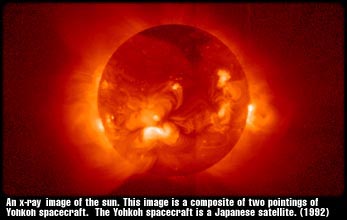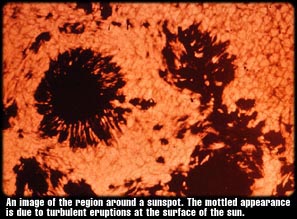|
|
|||||
|
Where Sunspots Happen |
|
||||
 About the Sun About the SunTo better understand the process that creates sunspots we first need to learn more about the sun. The sun is by far the largest object in the solar system, containing more than 99.8% of the total mass of the solar system (Jupiter contains most of the rest). The sun is made of about 90% hydrogen and 8% helium, with traces of many other elements. Over time, the nuclear fusion reactions that fuel the sun's core are converting hydrogen into helium, changing the ratio of these two elements. These reactions create a tremendous amount of energy, which appears as light, heat: the motion of atoms and particles within the sun. |
|||
Convection: what goes up... This moving of heat in a flow of matter is convection; it works the same way in a pot of water on the stove, where a current of water heated at the bottom carries energy toward the surface. After some of the energy is released in steam, the cooled water sinks back down, is re-heated, and starts up again in a circular pattern. The circulating plasma flows in the Sun's convection zone "rise" (move outward) all over the sun to release heat in the solar atmosphere, then sink back inward to be re-heated.  The
circulating motion of the convection layer at the sun's surface, or
photosphere,
creates the granular pattern in the area outside of the sunspots shown here.
Each granule is a separate flow of hot plasma from the
interior. Next,
we'll look at the role of the convection layer in the creation of sunspots. The
circulating motion of the convection layer at the sun's surface, or
photosphere,
creates the granular pattern in the area outside of the sunspots shown here.
Each granule is a separate flow of hot plasma from the
interior. Next,
we'll look at the role of the convection layer in the creation of sunspots. |
|||
|
|
|||||
|
|
|||||
|
©Copyright 2001 Regents of the University of California. |